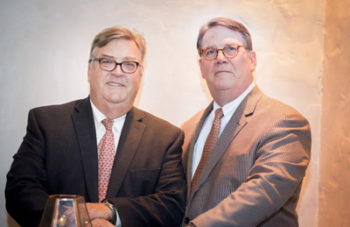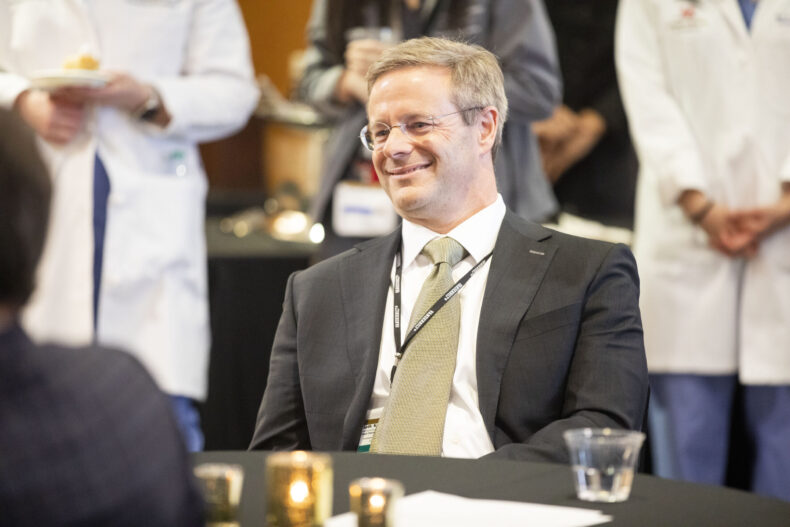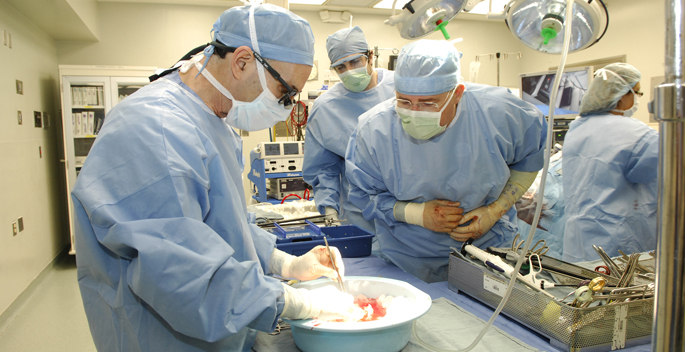Members of the Vanderbilt Transplant Center gathered last week to commemorate the 2,000th liver transplant performed at Vanderbilt University Medical Center (VUMC).
One of the largest liver transplant programs in the Southeast, VUMC is one of only 11 programs in the United States that have performed more than 2,000 liver transplants.

It’s a day the former director and founder of the liver transplant program C. Wright Pinson MBA, MD, never envisioned.
“We got pretty fired up about No. 10 and 25, 50, 75 and 100,” said Pinson, Deputy CEO and Chief Health System Officer for VUMC. “I realize it doesn’t seem like much now, but we thought it was a big deal back then. I never thought that I would see the day this would happen.”
Pinson, along with Kelly Wright Jr., MD, performed the center’s first liver transplant in 1991.
“As Tennessee’s only comprehensive transplant center, we have seen tremendous growth and extraordinary outcomes,” Pinson said.
“Since its inception, the liver transplant program has experienced continued improvement in many areas like patient outcomes, quality of life, cost reduction and research efforts garnering national recognition as a center of excellence.”
Several key facts were highlighted during the celebration:
- The adult liver program is ranked fifth in the country in volume (as of Oct. 31).
- The combined adult-pediatric liver transplant program is tied for sixth in volume (as of Oct. 31).
- The median wait time to transplant is 4.3 months at Vanderbilt, compared with the national average of 15.2 months.
- Length of stay for Vanderbilt liver transplant patients is four days shorter than the national average.
- There have been 2,017 liver transplants since the program’s inception (as of Nov. 30).
Seth Karp, MD, H. William Scott Jr. Professor of Surgery, chair of the Department of Surgery and director of the Vanderbilt Transplant Center, said the success of the liver transplant program is a result of the multidisciplinary approach to care.
“Transplant is the ultimate team sport,” Karp said. “Everyone’s expertise counts. We all play a role to make sure our patients receive the highest quality of care. Everything we do, we do for our patients.
“I see it when I walk around the transplant center — the attitude and collaborative spirit is emblematic of what we do every single day and it makes me proud to be a member of this team.”
Roman Perri, MD, medical director of the adult liver transplant program, and Sophoclis Alexopoulos, MD, chief of the Division of Hepatobiliary Surgery and Liver Transplantation and surgical director of the adult program, also gave remarks.
Both applauded the team’s commitment and dedication as reasons for the program’s success.
Alexopoulos recognized Wright, one of the liver transplant team’s surgeons since the program’s inception.
Wright, one of the instrumental figures in the development and success of the liver transplant program, served as chief of the Division of Hepatobiliary Surgery and Liver Transplantation from 2009-2016.
He was honored with a framed poster celebrating the 2,000th liver milestone.
The event also remembered Jerita Payne, MSN, ACNP, MMHC and former director of Clinical Transplant Services, who died in March. A silent auction was held to benefit the Jerita Payne Education Fund for Transplant Nurses at Vanderbilt.















